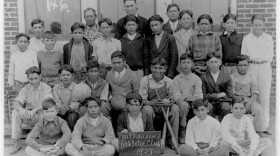
Melissa Block
As special correspondent and guest host of NPR's news programs, Melissa Block brings her signature combination of warmth and incisive reporting. Her work over the decades has earned her journalism's highest honors, and has made her one of NPR's most familiar and beloved voices.
As co-host of All Things Considered from 2003 to 2015, Block's reporting took her everywhere from the Mississippi Gulf Coast in the aftermath of Hurricane Katrina to the heart of Rio de Janeiro; from rural Mozambique to the farthest reaches of Alaska.
Her riveting reporting from Sichuan, China, during and after the massive earthquake in 2008 brought the tragedy home to millions of listeners around the world. At the moment the earthquake hit, Block had the presence of mind to record a gripping, real-time narration of the seismic upheaval she was witnessing. Her long-form story about a desperate couple searching in the rubble for their toddler son was singled out by judges who awarded NPR's earthquake coverage the top honors in broadcast journalism: the George Foster Peabody Award, duPont-Columbia Award, Edward R. Murrow Award, National Headliner Award, and the Society of Professional Journalists' Sigma Delta Chi Award.
Now, as special correspondent, Block continues to engage both the heart and the mind with her reporting on issues from gun violence to adult illiteracy to opioid addiction.
In 2017, she traveled the country for the series "Our Land," visiting a wide range of communities to explore how our identity is shaped by where we live. For that series, she paddled along the Mississippi River, went in search of salmon off the Alaska coast, and accompanied an immigrant family as they became U.S. citizens. Her story about the legacy of the Chinese community in the Mississippi Delta earned her a James Beard Award in 2018.
Block is the recipient of the 2019 Murrow Lifetime Achievement Award in Journalism, awarded by the Edward R. Murrow College of Communication at Washington State University, as well as the 2019 Lifetime Achievement Award from the Fulbright Association.
Block began her career at NPR in 1985 as an editorial assistant for All Things Considered, and rose through the ranks to become the program's senior producer.
She was a reporter and correspondent in New York from 1994 to 2002, a period punctuated by the terrorist attacks of Sept. 11. Her reporting after those attacks helped earn NPR a George Foster Peabody Award. Block's reporting on rape as a weapon of war in Kosovo was cited by the Overseas Press Club of America in awarding NPR the Lowell Thomas Award in 1999.
Block is a 1983 graduate of Harvard University and spent the following year on a Fulbright fellowship in Geneva, Switzerland. She lives in Washington, DC, with her husband — writer Stefan Fatsis — and their daughter.
-
This year, more original, highly anticipated summer TV series are debuting on the broadcast networks than ever before — along with some big-ticket series from cable and one of Netflix's biggest shows.
-
Information tracked by educational software can be of great help to teachers. But as Politico's Stephanie Simon explains, private companies can also monetize the data by selling it to marketers.
-
At Arlington National Cemetery, President Obama honored the sacrifices of those who died while serving in the military. We remember the stories of some of those who died in America's longest war.
-
The federal Medicare program for the elderly and disabled will cover two new drugs that can cure hepatitis C, a liver disease that can cause cancer and lead to death. The drugs are very expensive, but they cure hepatitis C in most cases. The government and insurers are concerned about these costs; three million Americans have hepatitis C, most of whom don't know they have it.
-
Stanford says it will its divest holdings in coal companies over climate change concerns. It's the most prominent of the roughly one dozen colleges that have decided to sell off fossil fuel holdings.
-
Ryan Beitz has a goal: Collect every VHS copy of the movie Speed known to man. He has over 500 of them now, he says. But the man pushes on, scouring the earth for more.
-
Mike Lazer-Walker created a free browser plug-in called Literally, which replaces the word "literally" with "figuratively" in all online text. As the website explains, that's literally all it does.
-
Lyndon Johnson taught in the South Texas town of Cotulla in 1928. Even as president, he always remembered the grinding poverty of his students.
-
Melissa Block and Audie Cornish read letters from listeners about the demands made on students and student-athletes in college.
-
In Killeen, Texas, another mass shooting had some asking, "Again?" The flags flew at half staff as the community began to pick up the pieces.



